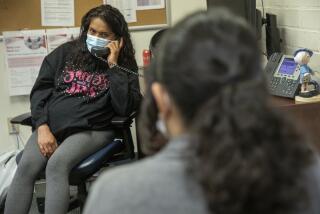Expanding Health Care
Serious and welcome attention is being focused in Sacramento on the urgent problem of providing health care to those who are not protected or who are inadequately protected by government and private insurance programs.
In the absence of action in Washington, all states face enormous obstacles in trying to resolve the outstanding problems. California may lead the way.
Gov. George Deukmejian has not yet offered a package response to the problem in California, but he has given indications that he may meet this problem in the same way he has faced the crisis in education--by seeing to it that a more adequate level of funding is made available. He is being given support for that by the Democrats who control the Legislature.
The governor has already done three things:
--He has proposed a $15-million increase for two University of California hospitals, in Davis and in San Diego, that also serve as general public acute-care hospitals, with many indigent patients, operating much in the same way that county hospitals serve elsewhere in the state. The increased funding respects the higher costs that are inevitable in a teaching setting, and also the unusual burden of costs, as in county hospitals, of providing care for patients who, in sum, are sicker.
--He has proposed a 4% increase in the funding for the stateŌĆÖs payments to counties for caring for medically indigent adults--a step, if inadequate, in the right direction.
--And he has committed himself to a reorganization of Medi-Cal that, while not yet addressing basic flaws in the financing, holds promise of more effective services.
The Legislature is also moving ahead. A compromise budget of $50 million for medically indigent adults has been proposed to ease the burden on counties. Also under consideration are a bond issue to help construct improved county health facilities and a special budget fund to assist hospitals with disproportionate burdens of patients unable to pay for medical services--an urgent problem affecting most hospitals. The governorŌĆÖs commitment to more equitable funding, reflected in his own budget proposals, has raised the possibility that he will support the higher funding under consideration in the Legislature--including the compromise on the medically indigent. That would be a useful step.
There is growing recognition that the California experiment in containing health-care costs through competition will collapse unless adequate provision is made for the poor who are not otherwise protected. A failure to assure care for any segment of the population represents both a public-health danger to the entire population and a denial of what a presidential commission recently called societyŌĆÖs ŌĆ£ethical obligation to ensure equitable access to health care for all.ŌĆØ
Medically indigent adults not covered by Medicare or Medi-Cal were made the responsibility of the counties in California as part of the 1982 revisions, with the state agreeing to pay the equivalent of about 70% of the cost of this service to the counties. The counties have found this increasingly onerous, given the limitations on their ability to raise revenue imposed by Proposition 13 and diminishing state support. In Los Angeles County, for example, officials estimate a $32-million shortfall for next year--even with the increase proposed by Deukmejian.
California is moving to put its Medi-Cal beneficiaries into pre-paid health-care programs such as health-maintenance organizations. Legislation to facilitate an extension of this to about 60% of those in the Medi-Cal program by 1989 is before the Legislature. The first pilot programs will be undertaken this year in San Diego and in the San Fernando Valley. Those eligible for Medi-Cal would be offered several options of health care and then bound to the provider organization of their choice. They would no longer be able to choose an individual physician.
Funding the new Medi-Cal pre-paid programs will only complicate an already difficult financial situation. The program is now underfunded. About half the money comes in matching federal funds. The state has squeezed its share by negotiating tight contracts with hospitals at fees below cost and by compensating doctors and dentists at roughly 50% of their normal fees. Growing resistance from hospitals is inevitable, just as many physicians and dentists already resist participation. Those fee structures need to be corrected even as the experiment in group protection gets under way.
The most encouraging sign at the moment is the governorŌĆÖs openness to reform at a time when the surplus in state income assures the availability of required resources. The governor has wisely adopted a policy of prudence, committing himself to a substantial reserve. But he still has substantial leeway to address the backlog of programs desperate for additional funds--notably forc mental-health services, for the community colleges and for basic health services. His openness recognizes the importance of these programs for every person in the state. The Legislature has pointed ways to respond to this.
More to Read
Get the L.A. Times Politics newsletter
Deeply reported insights into legislation, politics and policy from Sacramento, Washington and beyond. In your inbox three times per week.
You may occasionally receive promotional content from the Los Angeles Times.










